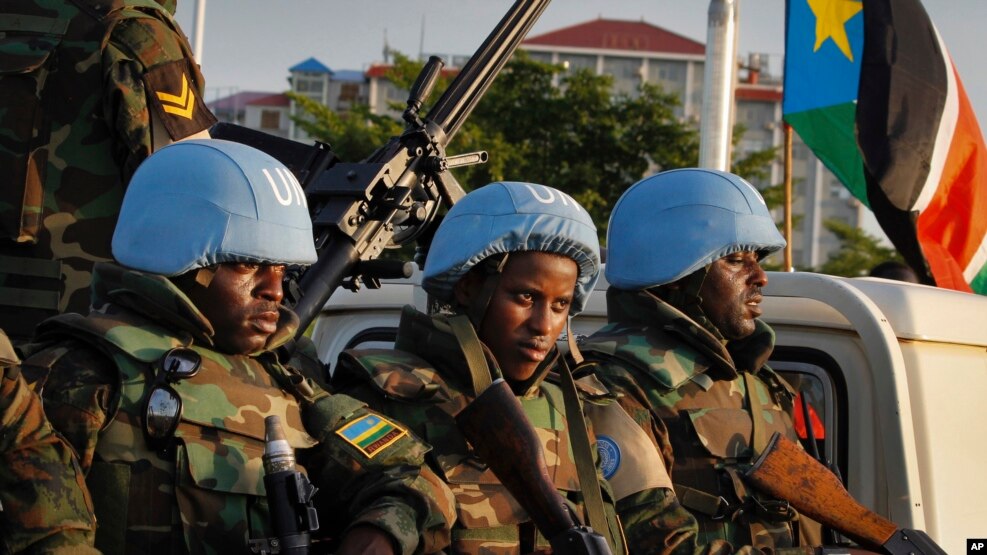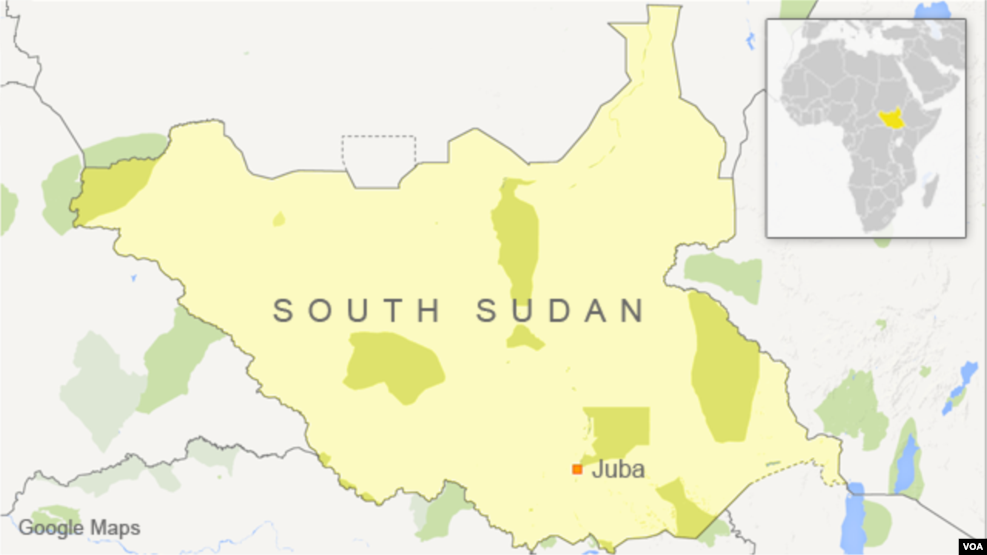Date: Wed, 7 Sep 2016 22:25:51 +0200
Some South Sudanese Want Restrictions on Troop Deployment

FILE - U.N. peacekeepers wait to escort members of the U.N. Security Council as they arrive at the airport in Juba, South Sudan, Sept. 2, 2016. One South Sudanese lawmaker says a regional protection force will need to be better armed than the current peacekeeping force in the country.
While most South Sudanese lawmakers say they welcome the government’s decision to accept the deployment of a regional protection force, some say the government has the right to place conditions on that deployment, including the number of troops, their types of weapons and which countries they should come from.
After initially opposing the troop deployment, the government caved to international pressure following a visit from U.N. Security Council members last weekend, saying it no longer opposed a regional protection force.
But on Tuesday, that position shifted again. Member of Parliament Zachariah Matur, who represents Rumbek in Western Lakes State, said the government must have a say in choosing which troops are deployed to South Sudan.
“It seems we are surrounded by quite a number of hostile nations that have a vested interest in our country," Matur said in Juba. "They would like to get a chance to get in and exploit us. So our government will negotiate on those things to see which countries are going to contribute to this force and also the kind of equipment they are going to bring to the country.”
Protection of women's rights
Flora Solomon, another member of parliament who represents Imatong State Assembly, said she hoped the protection force would focus on protecting the rights and dignity of women.
“I think this force, when they come, they will be helping us more because we are now tired," Solomon said. "Since 2013, women are the victims of this senseless trouble which has come to South Sudan, and I hope these forces will help the situation of prevention of violence against women.”
The leader of the minority in the National Assembly, Onyoti Adigo, said if the protection force is to effectively discharge its mandate, the troops must be well-armed, and he noted the current peacekeeping force is not well-armed.
“They were overpowered by the equipment of the government," Adigo said. "So if you have balanced power, then it can be OK. But it is not for fighting. The whole issue is: How do we come to cooperate?”
Thomas Wani Kundu, who represents Lainya County in the South Sudan National Assembly, said he was hopeful that the country’s security would improve after deployment of the regional protection force, which is expected later this month.
“We expect a positive impact after the additional forces [are deployed] under UNMISS to South Sudan," Kundu said, referring to the U.N. Mission in South Sudan. "With the new mandate, we are also optimistic that they will protect the civilians and protect the people in UNMISS and eventually will encourage people from the camps, whenever there is a peace, to come out and go to their houses to resume their normal life.”

Too late to negotiate?
At least one South Sudanese analyst said Juba could not negotiate the number of troops, types of weapons or where the troops come from because a U.N. member country cannot negotiate with the Security Council after it has already agreed to the deployment of troops.
Political science professor James Okuk of Juba University said the council may change the mandate of the protection force to one of peace enforcement if it determines that the government is not cooperating.
“Since they have given their consent and it is written, that’s what the U.N. Security Council will follow when they start deploying the regional protection force by the 30th of this month. So nothing is going to stop them,” Okuk said.
Chapter 7 of the U.N. Charter states that U.N. peacekeepers are allowed to use force to ensure the peace and protection of civilians in accordance with the U.N. resolution. It allows the council to "determine the existence of any threat to the peace, breach of the peace or act of aggression," and to take military and nonmilitary action to "restore international peace and security."
Cooperation urged
Okuk said the international community won't tolerate a volatile situation that causes civilians or noncombatants in a foreign country to suffer. He warned that if the government insisted on trying to place restrictions upon troops, arms or contributing countries, the U.N. might feel it has no choice but to impose “plan B.”
“What’s needed is cooperation, and what they can work for is to see to it that they do a joint venture to this cooperation, and it might turn out to be positive later. But if they refuse the cooperation, they might force the Security Council to go to plan B of what they have said, which is peace enforcement accompanied by arms embargo and sanctions,” Okuk said.
The best course of action for the government, according to Okuk, is to implement the Intergovernmental Authority on Development-brokered security arrangements spelled out in the August 2015 peace agreement.
“The priority now is to restore peace and trust — the trust from the people here and the trust from the international community — and that can be restored by committing themselves to the implementation of the agreement, so that it does not collapse,” Okuk said.